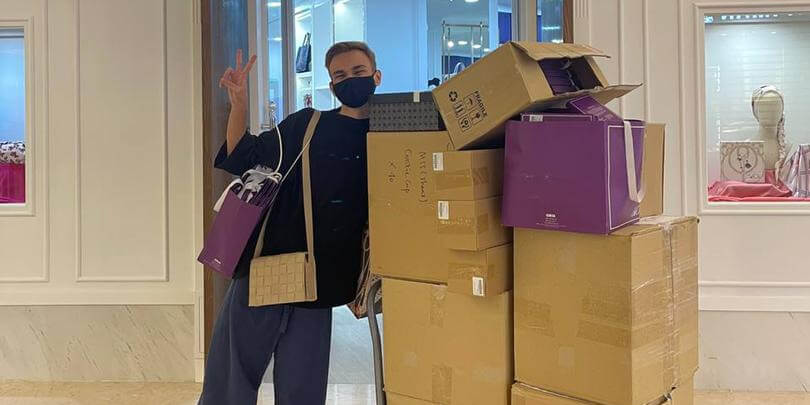Retail obsession drives Kuala Lumpur’s personal shoppers’ hunt for bargains
Personal shoppers and shopaholics kept brands, including modest fashion labels, trading during the pandemic.
KUALA LUMPUR: Student Wan Muhammad Muqri has a “passion for fashion” and spends most of his spare time at private sales and secret events looking for discounts on local hijab and abaya brands.
Like him, Noor Azna, a Kuala Lumpur mother and self-confessed shopaholic, relishes queuing up for many hours to snaffle a bargain for her 4,000 impatient customers.
Together, they are leaders in a trend that has exploded in Malaysia over the last two years of lockdown: personal shopping.
“It’s buying things that people want that we find and sell at below retail price,” Wan Muhammad told Salaam Gateway. “My customers don’t have time to go out and find the items themselves, but they are willing to pay us extra money to get fashion for them.”
Over time, he has built up relationships with brands and stores across the Malaysian capital. These even invite him to private sales events they hold for personal shoppers or offer him a preview of a new line because they know he will get their products to his customers within hours.
Noor Azna - who goes by the name Nana - is more interested in beauty and cosmetics, although she will “buy anything that is a good deal.” With other personal shoppers, she was even given exclusive access by Kuala Lumpur International Airport to its duty free stores after the airport closed down during the pandemic.
“They authorised us to come into the building; I was given a boarding pass to come through to the departure area, just to shop,” she told Salaam Gateway.
When you consider the scale of her purchases, it makes sense. In a hard-working month, she can buy and sell some 200,000 units among her group. She posts her stock on social media; when a customer likes what they see, they will buy the item and pay immediately. Nana will then ship the goods and wait for the next buying opportunity.
Wan Muhammad first started personal shopping as a 16-year-old at school as a means to save money. By buying and selling the luxury dUCk brand of hijab to friends - “they were very hot-selling” - he managed to put away 10,000 ringgit ($2,400) pocket money in his first year.
After finishing school, he began joining private sales put on by brand owners who would invite him directly, along with a dozen or so other personal shoppers, to preview new lines or hoover up slow-moving stock for a discount. Now aged 20 and a mass communications student, he hopes to make a career in this form of retail.
Wan Muhammad admits to being obsessed with local designer Nazifi Nasri’s sandals and is a regular middle-man for Abayalubnaa, a Malaysian abaya brand. However, he moves where the market goes, even if this is not in the direction of his favourite brands.
“It’s in my nature. I’m interested in buying and selling. You need to have passion - a passion for fashion. You need to know about trends, and I was born with it - I’m really into fashion,” he said.
Nana, for her part, quit her job in printing in 2017 and began taking orders from friends on the hunt for bargains.
Unlike Wan Muhammad, who buys to order, Nana speculates by buying stock that she thinks will appeal to her market. To get the best prices, she buys in bulk with a syndicate of other personal shoppers. Flush with stock, she then promotes her wares through social media and live sales - a popular digital form of the traditional home shopping networks on television.
In a short time, she built strong relationships with brand owners and stores, and then the pandemic ramped up her business.
“When COVID-19 hit Malaysia, this service became quite important to people. They didn’t want to go out, they didn’t want to queue, so my business grew quickly,” she said.
“There’s been a lot of personal shoppers entering the market since the pandemic. To keep customers loyal to me, I’ll make sure the my service is perfect. If they don’t like their product, I will refund them immediately.”
Personal shoppers have been hailed as the saviours of the Malaysian fashion retail industry during the pandemic, by the industry.
“I don’t know how we would have got through it without them,” an executive at one of Malaysia’s major store groups told Salaam Gateway on condition of anonymity.
“When malls were closed and we were feeling our way into online retail, because that was the only way we could keep selling, these guys came to the rescue by buying up our stock and making sure it kept moving,” he added.
The trouble with this relationship is that it has to be conducted very quietly, for reasons that become obvious.
“We can never be seen to endorse them, since they are effectively buying discount stock, adding a mark-up and then re-selling it,” he said. “They make us look pretty silly, actually, because if you think about it, why aren’t we selling that stock directly to their customers?”
When Salaam Gateway relayed this to Wan Muhammad, he was taken aback, saying: “We don’t go out to save brands; we just go out to get bargains. Anything below retail price is considered cheap, so our customers will be pleased and buy what we get. It’s a simple case of supply and demand, and everyone just ends up happy.”
© SalaamGateway.com 2021 All Rights Reserved
